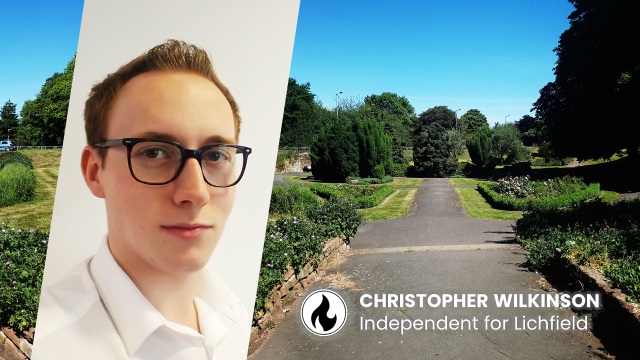Christopher Wilkinson is an independent libertarian-minded candidate proposing to stand for the Lichfield City North division in the 2021 Staffordshire County Council election and the Stowe ward by-election for Lichfield City Council. Chris also runs a group called the Independent Libertarians and has a podcast, the Libertarian Listener, which both Mike and Dan have appeared on. We spoke with Chris on our Podcast back in October and have caught up with him on his upcoming campaigns.

“Perhaps worst of all has been this focus on the ‘common good’ – the rotten, Soviet-style idea that we’ve all got the same interests, same needs, and same ambitions as everyone else and that we’re willing to sacrifice our own job, income, business, mental health and physical wellbeing for the sake of the lowest common denominator in the community. Nothing could be further from the truth”
Chris you’ve run before and are taking part in two election campaigns in May. What’s prompted you to take on these challenges and what are the differences between the two races?
These elections are especially important since they’re the first since COVID-19, and they look set to be a virtual referendum on how the main parties have responded to the issue. Over the past year we’ve seen our civil liberties and freedom severely restricted, the economic strength of the nation destroyed, and reactionary government policies encroaching into every aspect of our daily lives – unprecedented and immoral, especially for peacetime. Perhaps worst of all has been this focus on the ‘common good’ – the rotten, Soviet-style idea that we’ve all got the same interests, same needs, and same ambitions as everyone else and that we’re willing to sacrifice our own job, income, business, mental health and physical wellbeing for the sake of the lowest common denominator in the community. Nothing could be further from the truth. That philosophy is so against the grain of human progress, prosperity and self-fulfilment that it has never worked in any historical example, and my attempt in this election will be to attempt to drag politics back to reality. As there are very few people in the area willing to stand for office, the onus is upon those with a passion to provide change to make it happen hence why I’m standing in both elections. The main difference will be the area covered; the City by-election is being run in my own ward of Stowe, and the County election covers Stowe with two adjacent wards; Chadsmead and Curborough. One benefit of this approach is that a wider number of people get to hear a pro-liberty message, which may in turn inspire them to get more involved in local politics and help fight for local people in future elections. There will be other differences, particularly with the scale of the issues varying between local and regional level, and the amount of walking involved when delivering the leaflets!
Stowe is currently represented by Labour and Conservative in a Conservative city. How do you think they will be better represented by an independent and what do you think are the big issues in Stowe?
I think people are rightly put off by party politics after what they’ve seen over the last twelve months, and so standing as an independent that can put local people’s interests first and assess local issues objectively instead of focusing on party ideology and dogma would make for a far better representative in any area. Political events over the past five years have been very polarising and the key advantage of being an independent candidate is that I’m able to find common ground between people who would otherwise stand apart. In the Stowe area, the most major concerns among residents are the transition back to normality and restarting the economy. The city’s age demographic is slanted more towards the older generations who rightly have concerns over feeling safe going outside again and being in busy areas. I want them to enjoy their lives as best as possible, so it’s critical that elected representatives give truthful information regarding COVID-19 instead of merely relaying the government’s fearmongering and skewed macro-level statistics. Lichfield also has a highly skilled managerial workforce and as such has generally lower-than-average levels of unemployment coupled with a city centre in economic decline – to see unemployment levels rise and businesses in the city centre shut their doors for the final time, especially pubs and ‘non-essential’ shops, therefore represents a significant worry for both residents and visitors. I’ve been speaking with several local businesses and organisations as to how we can bring more people into the city centre and my manifesto will reflect the consultation I’ve had.
“However, demolition work on the proposed site had already begun – a few businesses, including a profitable Ford car dealership, were consequently evicted. The site today is a wasteland obscured by hoardings covered in local government advertising for the city”
Following the failure of Friarsgate, the city now has a ‘Masterplan’. What are your thoughts on what went wrong with Friarsgate and what do you think of the new plan?
Friarsgate was a £54 million shopping development first proposed by the Conservatives in the 1999 local elections that was still in development nearly twenty years later. To put the scale of finance in context, it would have been the equivalent of five years of budget spending by Lichfield District Council in today’s terms. The scheme couldn’t attractive private finance and the council, quite rightly, were not willing to meet the extra cost on behalf of taxpayers. However, demolition work on the proposed site had already begun – a few businesses, including a profitable Ford car dealership, were consequently evicted. The site today is a wasteland obscured by hoardings covered in local government advertising for the city which cost more than £20,000 at the taxpayer’s expense. It went wrong both at a council level and in terms of the economy generally. Referring to the phased strategy and planning permission needed for the Lichfield Masterplan, District Councillor Little was reported in a Lichfield Live article on 7 October 2020 as saying ‘…we need the support from commercial and legal experts to aid us in that process as we haven’t got that expertise within the council to ensure proper governance’ – an admission, if ever one was becoming of the council, that incompetence within the local authority was partly to blame for the downfall of Friarsgate. The truth is there’s very little demand for large commercial infrastructure, especially in a city such as Lichfield, and that restrictions within the COVID-ravaged economy will come to haunt such developments for years to come. The retail sector has been in structural decline for a long time not least due to the growth of online shopping and increasing business rates levied by councils all over the country. The design of Friarsgate was very metropolitan and certainly wouldn’t have suited the quaint character of a cathedral city such as Lichfield. From my research speaking to business owners in the city centre, the main draw factor to Lichfield appears to be its picturesque setting, traditional architecture and unique old-world shopping experience. The council’s economic policies should be reorientated more towards preserving and enhancing Lichfield’s history and heritage as opposed to trying to turn the city into replicas of nearby places such as Tamworth or Burntwood. Lots of smaller niche shops would be more advantageous for local people and visitors than a sprawl of chain stores; Fine & Vintage, a small independent retailer, is an excellent example of what I think Lichfield ought to aim for. At present, the Masterplan does not encapsulate all these crucial factors that will make the difference between the proposal being a success or failure, and so reform and review – not speed and spending – would be the most appropriate way to go about this project.

“Currently there are plans for housing developments at Nether Stowe and Leyfields on urban green space plus the construction of a filter lane cutting through part of the Festival Gardens – I strongly oppose all these projects and will do my best if elected to bring about more suitable alternatives”
With plans for over 4,000 houses for the city and calls for a gender-neutral term to replace chairman, what are the other big issues in the city?
Lichfield was once a semi-rural small historical city with many people saying they’ve moved to live here for its quiet, idyllic setting. The growth in housing in the area over recent years has been unacceptable and has eroded that traditional image of the city. It’s also important to bear in mind why the growth of housing has occurred. The council has adopted a Local Plan and numerous neighbourhood plans to improve certain aspects of the city that are being rolled out over many years. Overlaying that are the central government’s own house building plans. The issue here in Lichfield, however, is that the supply of housing is already above trend as was revealed by District Councillor Tax last October. The government must reconsider its housing targets for this area as central planning does not consider our specific requirements and, if elected, this is something I will pursue with determination. An oversupply of housing is never desirable since bricks and mortar have been a key driver of the British economy over the past twenty years – if that hidden wealth falls due to a lack of demand, we’ll all be paying an extra price in either higher taxes or lower public spending as councils and the government try to stabilise their budgets. Eerily, a similar phenomenon has already occurred with industrial space located south of Lichfield Trent Valley Railway station and the recently constructed Imperial Retail Park took two full years to reach full occupancy. Financial and material resources would be more effective elsewhere at this time. In terms of gender-neutral language, my preference is very clear – if I wished to be referred to as ‘chairman’ or ‘chairwoman’ or ‘chairperson’, I’d hope to be referred to as chairman, chairwoman or chairperson respectively. It’s a matter of personal preference that certainly shouldn’t be enforced to delegitimise natural gender values. There is nothing wrong with being a man or a woman, and our language should reflect that by reinforcing who we are as individuals. It’s hardly a headline issue, and there are bigger fish to fry what with the state of our potholed roads, cracked pavements and empty grit bins! Above all, the issue of the environment is very high on the agenda. Currently there are plans for housing developments at Nether Stowe and Leyfields on urban green space plus the construction of a filter lane cutting through part of the Festival Gardens – I strongly oppose all these projects and will do my best if elected to bring about more suitable alternatives.
You are also planning to run in the Lichfield City North division for Staffordshire County Council. Tell us about the area and what you hope to do for it. What would you like to see change at the council?
I believe in representative local democracy. As such, I hope to act on the priorities of local people as expressed through the survey I’ve issued to them which will be used to create a manifesto that truly represents the people whilst forging consensus on which we can build for the future. We’ve got to meet the challenges posed by remote working, education beyond the classroom and healthcare beyond the hospitals. I also aim to be a pro-business representative. One key consideration is a proposal to extend the Cross-City railway line towards Derby to alleviate road traffic on the A38, increase visitors and tourists from the East Midlands, and to make work at Fradley Park more accessible for those who don’t own a car. More can be done in terms of technical support to make the most of the shift from the physical to the digital economy by assisting small independent businesses to sell their products online, plus helping promote our unique Cathedral. Future housing developments must include supporting infrastructure such as shops, gyms, parks and public services to encourage the growth of the community and foster social cohesion. We’ve got the adapt quickly to the new needs of the economy by installing fast broadband in offices and cafes, adopting a more flexible approach to Business Improvement District investment that ensures no business becomes burdened with charges beyond its means, and keeping business rates and parking charges low to facilitate higher footfall. There must be an attitudinal change at the County council level about how to conduct local government – there are consultations being run with the same low response rates time after time, a lack of accessible representation and too much authority being held at the top instead of being devolved to local councils. Councillors must realise that there is no one single way of accomplishing something; what’s good for one area may not necessarily be good for another. I think there has to be a greater consideration for the externalities of decision-making particularly regarding the difference between policy on paper and policy in action; the notion that the ends do not justify the means. To use the local housing developments as an example, it might be desirable for those moving in having a home of their own and the boost to the local economy arising from that, but those who already live there are losing green space where their children may play, the local roads will be more congested and dangerous as a result of more vehicles lining the streets, and air and noise pollution will be worse.
“a redefinition of the relationship between state and citizen because, as we’ve seen in the past year, the state has assumed the position of the master and the citizen has become its servant”
As we move out of the lockdown, what would you like to see done on the road to recovery both locally and nationally?
I’d like to see a redefinition of the relationship between state and citizen because, as we’ve seen in the past year, the state has assumed the position of the master and the citizen has become its servant. Now we’re hopefully coming out of one of the worst periods in modern socioeconomic history, I’d like to see a fundamental challenge to the traditional authoritarian approach of statist government in favour of a libertarian approach that values the freedom, autonomy and natural rights of the individual with an emphasis on sovereignty, personal choice, free speech and expression, family values and the rule of law. I believe this a philosophy that can be expanded at both a local and national level, and I will work with unremitting energy – whether holding public office or not – to see it come to fruition.
If people would like to know more or get involved, how do they get in touch?
I can be contacted at christopherjwilkinson@protonmail.com, through my website at www.christopherjwilkinson.com, or by social media at www.facebook.com/christopherwilkinsonindependent.

